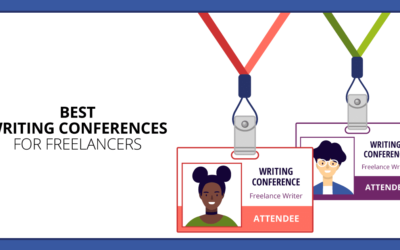If you want to carve out an income in the six-figure freelancing club, it might seem like a long shot based on where you’re at right now.
Maybe your $20-per-blog-post client feels like a soul-sucking, dead-end gig. Maybe every query, pitch and LOI you send seems to fall on deaf ears.
Or maybe you’re doing all the right things. But that six-figure freelancing goal still seems impossible. It’s not.
Freelance success takes more than hard work and dedication. It also requires something too many writers overlook-a well-planned strategy for moving up.
Five years ago, rookie freelancer Nicole Dieker swam with the bottom feeders, churning out content mill pieces for a few pennies a word.
Now she’s a rockstar columnist, blogger, copywriter, and novelist. And she’s fast approaching six-figure freelancing status.
Want to know how she did it? Check out her proven methods for increasing your income, moving up and earning more.
Freelance Writers Den shaped six-figure freelancing goal
A former Freelance Writers Den member, Nicole Dieker is now a regular columnist for The Write Life and The Billfold, and she recently published her first novel.
We recently caught up with Nicole in a podcast interview where she talked about:
- Setting realistic income goals
- Tracking work and income
- Time management
- Networking
- Finding a writing community
You won’t find magic formulas for success in this Q&A – just common-sense, workable strategies to help you plan for success in 2018 and beyond.
Q: How did you come up with your income goals?
A: When I started my column for The Write Life, I set the goal of earning $5,000 pre-tax every month. It was achievable, because I‘d done it in the past. But also a stretch, because I wasn‘t achieving it every month.
The act of saying what you want motivates you towards actually doing it. You look for ways to make that goal happen.
It took me a few months to start hitting that income goal consistently. From there, my income has steadily grown. Some months I earn $8,000 or $9,000.
Q: What’s a realistic income goal for a freelancer starting from zero?
A: When I started back in 2012, I had one goal, which was to earn more money this week than I‘d earned in the previous week. I earned, like, 3 cents a word doing content jobs. I didn’t transition immediately out of that. I‘d get a recurring gig or a column, and I‘d do content to fill in the gaps.
Q: What are the top three things you did to grow your career and hit your income goals?
A: Tracking income. I not only tracked what I was earning but also consistently looked for ways to seek out more money.
Pitching consistently. I pitched A LOT. At one time I was like, “You have to send out a new pitch every day,“ right? As I did this, I filled every other minute of my time with content work. I earned money and also pitched for higher gigs.
Building clips and growing visibility. I became well-enough known in the freelance world that clients started seeking me out. That‘s when the income growth took off, because I had leverage in terms of what they were going to pay. This third step is tricky, because you can’t control it. But if you keep pitching and keep building your clips, it’s more likely to happen.
Q: How can freelancers keep good records of their work and income?
A: I have made my records more detailed as I have continued to freelance. I originally tracked every piece I completed, then I added pieces I had been assigned. Then I could predict what I would be earning. I‘d think, “What can I do to bump that number up?“
From there you can add columns for invoicing. You start tracking word count. You track whether you’ve hit your monthly goal.
The last column I added was an “other things I need to do today“ column. This includes administrative tasks like pitching, getting in touch with contacts, or replying to comments.
Q: What’s one big life hack you’ve used to earn more and be more productive?
A: Time blocking. Oh, I love it so much! I set up my day knowing what I‘ll be doing for pretty much every hour. Obviously things come up and you have to adjust. But for the most part, I‘m like, “I need to check email for 20 minutes. Starting at 9:00 I need to transition to writing a piece. At 10 a.m. I‘ve got this podcast.”
Having a time block helps me make sure I‘m getting things done and hitting my targets. It lets me know whether I‘m able to do all the things that I tell everyone I‘ll do.
Q: How do you estimate the time it will take to write a piece?
A: To figure out how many words you can write per hour, I suggest looking to what you‘ve written before. How long has it taken you? Then add in research time. Figure out how long it takes, and you‘ll know how long it takes.
If I don‘t need to look things up, I can do 1,000 words an hour. But that takes a lot of practice.
Q: How can you increase your income by building your network?
A: Be a positive and supportive person in the freelance writing world. I do respond to comments. I’m positive on Twitter. I’ve also built my connections by doing enough good work that people want me to write for them.
I‘ve built relationships with editors, tried to make those interactions very positive, and tried to solve their problems and meet their needs. Then other people have heard about all that and want me to be part of their group.
Q: Why is it important to have a writing community?
A: It‘s good to have people who are just writers, who aren‘t your editors, to talk about the job with. You can bounce ideas off them and ask, “Is this client cool, or are they asking something unreasonable?“ Plus you can pass on news about new gigs.
Q: What did you learn in The Den that helped you the most?
A: The Den was my first writing community. I was able to check in with other members and say, “Is this a good deal? Is this a good idea? Hey, I found this job that was kind of grody.”
The Den taught me to think bigger. At the time I thought going from 3 cents a word to 5 cents a word was really, really great. The Den helped me expand my ideas of what I thought was a good freelance gig, which was invaluable. You can do a lot better than 5 cents a word.
What are you doing to move up and earn more? Join the conversation on Facebook.
Maria Veres is an Oklahoma freelancer who once (and only once) wrote an article for five cents per word. She teaches adult writing classes and contributes regular Q&A posts to Make a Living Writing.











